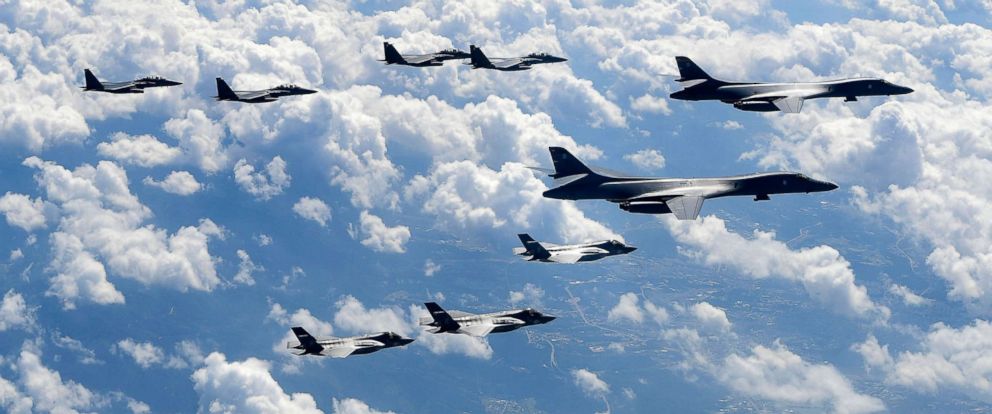North Korea Could Test Hydrogen Bomb In Pacific, Says Foreign Minister
September 21, 2017
North Korea could respond to Donald Trump’s threats of military action by testing a powerful nuclear weapon in the Pacific Ocean, the country’s foreign minister has said, hours after the North Korean leader, Kim Jong-un, said the US president would “pay dearly” for threatening to destroy the regime.
Ri Yong-ho, who is due to address the UN general assembly at the weekend, told reporters in New York: “It could be the most powerful detonation of an H-bomb in the Pacific. We have no idea about what actions could be taken as it will be ordered by leader Kim Jong-un.”
Ri was speaking after Kim said that he was considering retaliating at the “highest level” after Trump warned that the US would “totally destroy North Korea” if it was forced to defend itself or its allies.
Earlier this month, North Korea detonated a powerful hydrogen bomb at its Punggye-ri nuclear test site in the north-east of the country. The explosion caused a 6.3 magnitude earthquake that was felt over the Chinese border in Yanji.
Testing a nuclear device beyond its own borders would mark a major escalation in tensions over the regime’s ballistic missile and nuclear weapons programmes.
In a statement carried by the official KCNA news agency, Kim called Trump “mentally deranged” and warned him that he would “pay dearly” for issuing threats to the regime during his maiden UN general assembly speech on Tuesday.
Describing the president as “a rogue and a gangster fond of playing with fire”, Kim drew a critical comparison between Trump and his predecessors in the White House, calling him unfit to hold the position of commander in chief.
“Far from making remarks of any persuasive power that can be viewed to be helpful to defuse tension, he made unprecedented rude nonsense one has never heard from any of his predecessors.”
In a combative speech, Trump
warned he would “totally destroy” North Korea if it attacked the US or its allies, and called on other countries to cut the regime off from its sources of funds.
“The mentally deranged behaviour of the US president openly expressing on the UN arena the unethical will to ‘totally destroy’ a sovereign state … makes even those with normal thinking faculty think about discretion and composure,” the statement said.
Kim said Trump’s remarks had convinced him “that the path I chose is correct and that it is the one I have to follow to the last”.
He added that he was “thinking hard” about his response, but vowed that Trump would “pay dearly for his speech calling for totally destroying” North Korea.
“Action is the best option in treating the dotard, who, hard of hearing, is uttering only what he wants to say,” he said.
“Now that Trump has denied the existence of and insulted me and my country in front of the eyes of the world and made the most ferocious declaration of a war in history that he would destroy [North Korea], we will consider with seriousness exercising of a corresponding, highest level of hard-line countermeasure in history.”
His lengthy criticism of Trump ended: “I will surely and definitely tame the mentally deranged US dotard with fire.”
The statement came just hours after Trump issued a new executive order that expands US sanctions on North Korea’s shipping, banking, ports and manufacturing. Trump also claimed China’s banking system had shut down business with the country.
Reuters reported earlier in the day that China’s central bank had ordered financial institutions to implement UN sanctions rigorously after frequent complaints from Washington that Beijing was leaving open too many loopholes.
Trump thanked China’s president Xi Jinping and said the move was “very bold” and “somewhat unexpected”.
There was no immediate confirmation from the Chinese government that it had imposed a financial embargo on North Korea. If confirmed, it would represent a significant tightening of the economic noose around the Pyongyang regime, by a country which accounts for 90% of its trade.
But it is unclear whether any amount of financial or economic pain would induce Kim Jong-un to relinquish North Korea’s nuclear weapons and missiles, which he believes are essential for the regime’s survival.
Trump announced the new executive order during a working lunch with his South Korean counterpart, Moon Jae-in, and Shinzō Abe, the Japanese prime minister.
“Our new executive order will cut off sources of revenue that fund North Korea’s efforts to develop the deadliest weapons known to humankind,” Trump said. “The order enhances the treasury department’s authorities to target any individual or entity that conducts significant trade in goods, services, or technology with North Korea.”
Under the new measures, no ship or aircraft can visit the US within 180 days of going to North Korea. The same restriction would apply to any vessel involvement in ship-to-ship transfers with North Korean vessels. The order gives the US Treasury the power to sanction anybody involved in a wide variety of North Korean industries, ports, trade, and banking.
“Foreign financial institutions must choose between doing business with the United States or facilitating trade with North Korea or its designated supporters,” a White House statement said.
“To prevent sanctions evasion, the order also includes measures designed to disrupt critical North Korean shipping and trade networks,” he said. “For much too long, North Korea has been allowed to abuse the international financial system to facilitate funding for its nuclear weapons and missile programs.”
On the same day, the EU announced new sanctions of its own, including a ban on investment in North Korea and on EU exports of oil. The impact will be minimal, as trade and investment relations between North Korea and EU are tiny.




 Reply With Quote
Reply With Quote



Bookmarks